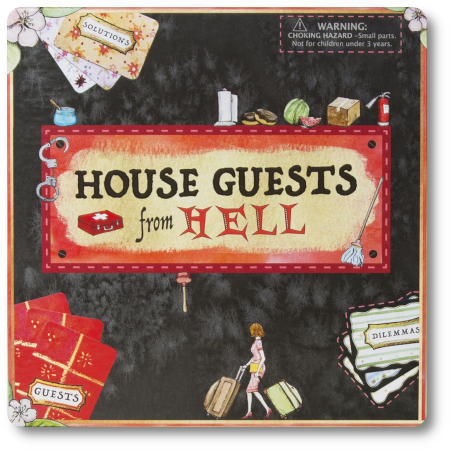
The Basics:
- For 2 to 6 players
- For ages 14 and up
- Approximately 90 minutes to complete
Geek Skills:
- Active Listening & Communication
- Counting & Math
- Logical & Critical Decision Making
- Reading
- Imagination
Learning Curve:
- Child- Easy
- Adult – Easy
Theme & Narrative:
- Time to get this house guest the hell out!
Endorsements:
- Gamer Geek rejected!
- Parent Geek mixed!
- Child Geek approved!
Overview
American polymath and one of the Founding Fathers of the United States, Benjamin Franklin, said, “Guests, like fish, begin to smell after three days.” Now imagine the worst possible house guest you are unlucky enough to have in your home. They will not leave. All they do is complain. They are giving you heartache and headaches. Time for this individual to go! But you need to get them out of the house delicately. You cannot burn bridges, after all. To solve this uncomfortable dilemma, you are going to need very creative solutions.
House Guests from Hell, designed by Peter Pritchett, Kathryn Pritchett, Elizabeth Pritchett, Shelly Pritchett (that’s a lot of Pritchetts!) and published by Golden Elixir Enterprises, is comprised of 80 Dilemma cards, 160 Solution cards, 30 House Guest cards, 18 Entertainment tokens, six Brimstone tickets, one cloth drawstring bag, one game board (approximately 20″ x 30″), six Player pawns, and two standard six-sided dice.
In theory…
Our copy had two dice bags and was missing the Entertainment tokens. You’d think that missing tokens would be an issue, but it isn’t. They are simply something you collect during the game that has no text or values listed. We substituted with Poker chips without any impact on the gameplay. I note this here to ensure the reader that the review provided was unaffected and to call attention to possible faults in the publisher’s quality assurance.
Prepping the Home for Company
To set up the game, first place the game board in the middle of the playing area and shuffle the Solution, House Guest, and Dilemma cards, placing them face-down to create three draw decks. Place the decks next to the game board.
Second, place the Brimstone tickets into the drawstring bag. This is an unnecessary step, as the Brimstone tickets are made of cardstock. You can just shuffle these and place them face-down if you like, as the backs of each ticket are blank.
Third, deal each player one random House Guest card, two Dilemma cards, two Solution cards/ Players now take a Player pawn color of their choosing. The color of their pawn determines the area of the game board they will be playing on at first. Place the Player pawns on the “Start” space that matches the Player pawn color. All players should read out-loud the text on the cards they were dealt. All cards, once given, are played face-up in front of the owning player.
That’s it for the game set up. Roll a dice to determine who should go first and begin.
Welcoming Your Unwelcome Guest
House Guests from Hell is played in turns with no set number of turns per game. A player’s turn is summarized here.
Step One: Draw Cards
The first thing a player does on their turn is draw two Solution cards and one Dilemma card. Again, all cards are read once they are drawn and remain face-up in front of the player for the duration of the game while in play.
Let’s talk about these cards for a moment…
The Dilemma cards come in two varieties. The first is a description of a truly horrible house guest. So horrific that no one in real-life would tolerate these individuals for very long. A summary is provided, and this is super important, as it describes the situation the player wants to resolve. The second is a “Draw Card” action that forces all players in the game to randomly select a Solution card from an opponent, adding it to their hand.
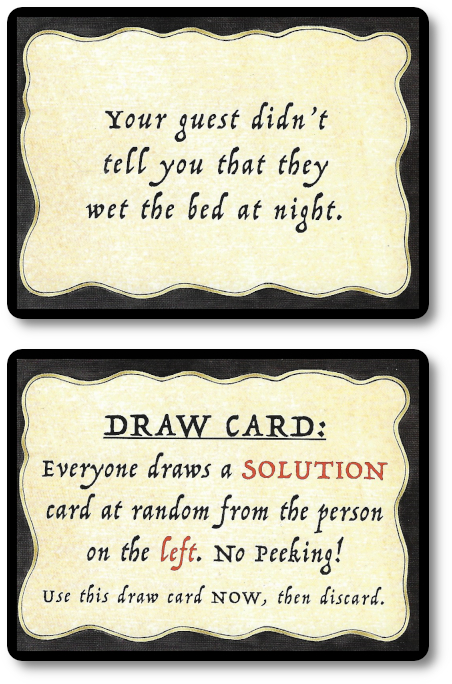
The Solution card describes things you’d find around the house or in the garage that could be used as tools to resolve the noted perils on the Dilemma cards. Maybe. Players will need to be very creative in how these tools are used, which is the charm of the game. There are also “Bonus” and “Action” Solution cards, which provide broader possible solutions or very specific ones.
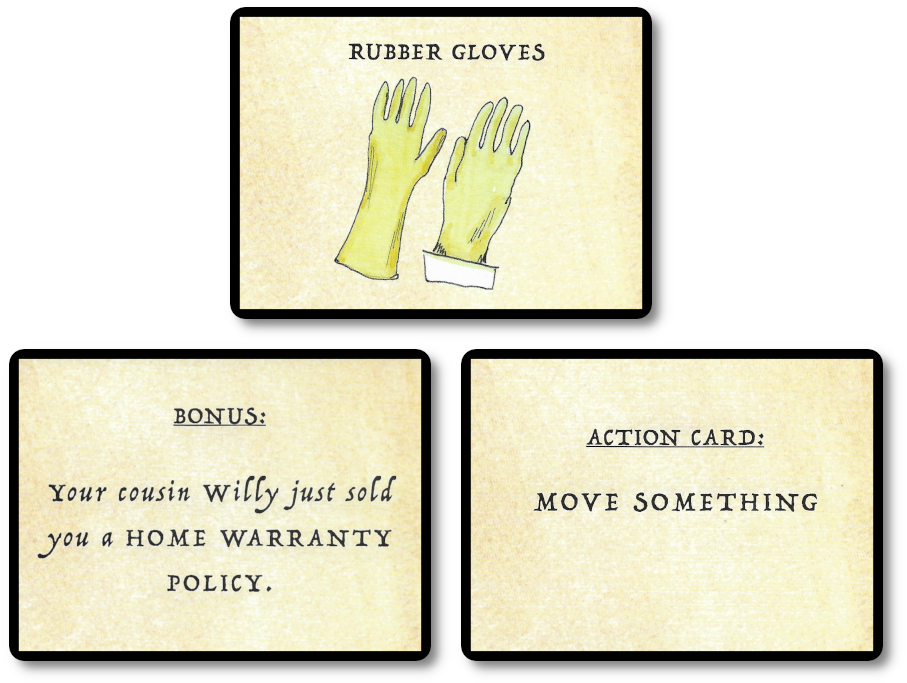
Step Two: Solve a Dilemma
With the cards in the player’s hand, they must now solve one of their Dilemma cards. This is done by pointing out the dilemma described, and then using one Solution card, describing how its use resolves the dilemma. This is all about being as creative as possible, using what little tools you have at your disposal. Feel free to be as descriptive and as boisterous as you like. The intent is to persuade the other players that your plan to resolve the dilemma using the solution selected will do the trick.
After the player describes the shenanigans, the player’s opponents take a vote. If the majority believe that the proposed solution would do the trick, they may continue their turn, and the Dilemma and Solution cards used are discarded. If the majority decides otherwise, the player’s turn is over, and the cards are kept in play. Ties go to the player, which allows this game to be played by only two individuals, but also makes the voting aspect unnecessary with such a small crowd.
Step Three: Decide on a Destination
Congratulations! Your solution to the dilemma was approved! Your reward is your turn continues, putting you that much closer to getting the house guest out of your home.
The House Guest card dealt to the player describes the individual that has come to visit and is being a real pain. Listed are three destinations that this particular guest has noted interest in. To have this house guest leave, the player must travel to these destinations on the game board. By doing so, they collect an Entertainment token.
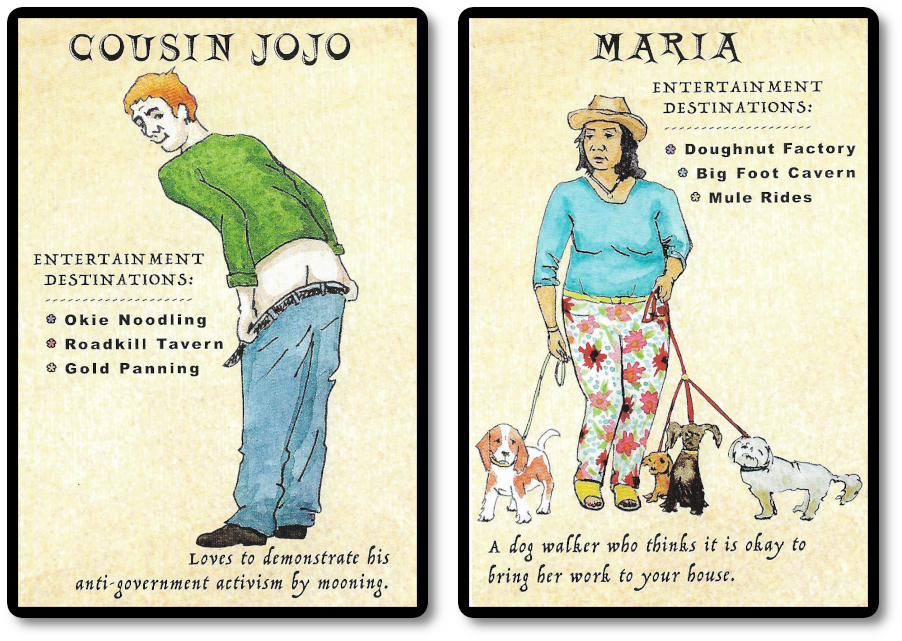
The player announces the destination they will be traveling to, taking note of the different possible routes shown on the game board. The player can visit any of the destinations listed and in any order.
Step Four: Roll Those Dice and Move that Pawn
After the player has announced where they are taking their house guest, they roll the dice. The number rolled determines the number of dotted space the player can move their Player pawn. There are four different dotted spaces.
A) Standard Dot: This is a common space. No additional action is taken, and the player continues to move their Player pawn.
B) Gold Spiral Dot: If the player ends their movement here, the player can steal one Solution card from any player of their choice, adding it to their collection. They also draw one Solution card from the draw deck.
C) Black Spiral Dot: If the player ends their movement here, the player discards their House Guest card and draws a new one. The player returns their Player Pawn to their original starting position. Any collected Entertainment tokens remain in the player’s possession.
D) Arrow Dot: Once landed on, the player ends their movement. The Player pawn is shifted to the noted named Destination. The player then collects one Entertainment token.
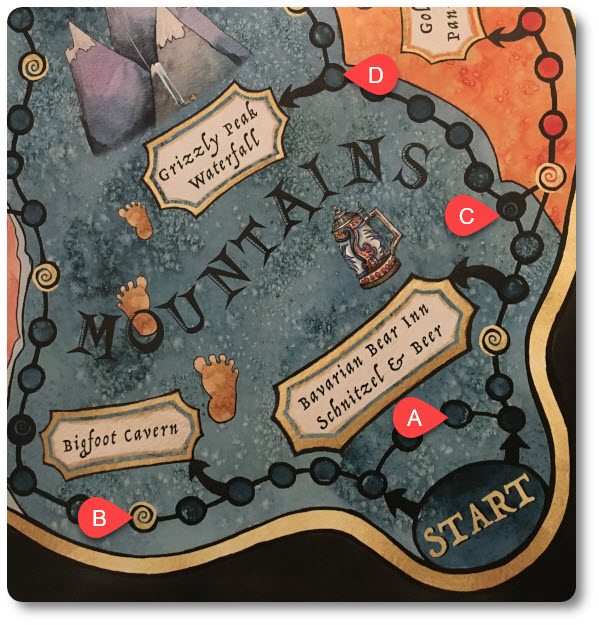
After the player has moved their pawn and resolved the space on which it lands, their turn ends. The next player in the turn order sequence now takes their turn.
Final Destination
Eventually, a player will collect three Entertainment tokens. Once they do, they now draw one Brimstone ticket at random. This ticket determines the player’s next and final destination. The player’s turn for the duration the game is the same listed above, except they no longer draw Dilemma cards.
Players are still required to solve any Dilemma cards they have in their possession using what few Solution cards they have remaining. As already noted, if the player is unable to get a majority vote that their proposed solution will resolve the dilemma, their turn ends.
Get the Hell Out
The game continues as summarized here until a player ends their turn at the location noted on their Brimstone ticket. Once they do, they have won the game.
Game Variants
If players are finding the game a bit too easy, the difficulty can be increased by reducing the number of Solution cards drawn per turn from two to only one.
If players are finding the game to be taking too long, the length of play can be reduced by requiring players to only collect two Entertainment tokens instead of three.
To learn more about House Guests from Hell, visit the game publisher’s website.
Final Word
 The Child Geeks enjoyed themselves, laughing at the absurdity of the house guests and being very creative with how they tackled the noted dilemmas. As one Child Geek put it, “I don’t know why I would ever let a person like this stay at my house, but if I had to, I would just ask them to kindly leave. Since I can’t, I’ll do the next best thing and come up with a foolproof plan to kick them out. I liked that challenge.” Another Child Geek said, “This game made me laugh, and I was grossed out, too. It was fun to hear about how horrible some of the guests are, and I liked how you had to be creative with your storytelling.” When the last guest was booted from the property, the Child Geeks voted to keep House Guests from Hell as a game they would play again.
The Child Geeks enjoyed themselves, laughing at the absurdity of the house guests and being very creative with how they tackled the noted dilemmas. As one Child Geek put it, “I don’t know why I would ever let a person like this stay at my house, but if I had to, I would just ask them to kindly leave. Since I can’t, I’ll do the next best thing and come up with a foolproof plan to kick them out. I liked that challenge.” Another Child Geek said, “This game made me laugh, and I was grossed out, too. It was fun to hear about how horrible some of the guests are, and I liked how you had to be creative with your storytelling.” When the last guest was booted from the property, the Child Geeks voted to keep House Guests from Hell as a game they would play again.
 The Parent Geeks were of two minds. From the perspective of a family game, they enjoyed House Guests from Hell a good deal. According to one Parent Geek, “Fun stuff for the family. Made us all smile and laugh. It was great to see the kids come up with creative ways to tell the house guests to get the hell out subtly.” But that is where the praise ended. For those Parent Geeks looking for a bit more “game” in their game, they found House Guests from Hell wanting. According to one of these Parent Geeks, “A good enough game for the family and casual for sure, but when I played it with other adults, it fell flat pretty quick. Rolling for movement and coming up with stories each time started to get old. Gameplay started to feel repetitive and predictable. Like the same joke told again and again. It also took too long.” When the final votes were in, the Parent Geeks gave House Guests from Hell a mixed endorsement. Great for the family with Child Geeks, but falling short for adult casual Parent Geeks.
The Parent Geeks were of two minds. From the perspective of a family game, they enjoyed House Guests from Hell a good deal. According to one Parent Geek, “Fun stuff for the family. Made us all smile and laugh. It was great to see the kids come up with creative ways to tell the house guests to get the hell out subtly.” But that is where the praise ended. For those Parent Geeks looking for a bit more “game” in their game, they found House Guests from Hell wanting. According to one of these Parent Geeks, “A good enough game for the family and casual for sure, but when I played it with other adults, it fell flat pretty quick. Rolling for movement and coming up with stories each time started to get old. Gameplay started to feel repetitive and predictable. Like the same joke told again and again. It also took too long.” When the final votes were in, the Parent Geeks gave House Guests from Hell a mixed endorsement. Great for the family with Child Geeks, but falling short for adult casual Parent Geeks.
 The Gamer Geeks didn’t care for this game. They found House Guests from Hell to be too casual and using game mechanics they usually find to be too random and limiting. For example, rolling dice to determine how many spaces can be moved was found to be a point of friction that either gave the player more than what they needed or falling short of what they wanted. Their biggest beef was the voting from their opponents that determined if their turn was going to worthwhile or not. According to one Gamer Geek, “The roll-and-move I can live with. It is a common and very traditional approach, despite not being a great way to play a game. What I didn’t care for is that I have to convince my opponents that I deserve a turn. Without having a natural method to determine success, I am fully dependent on others. I disliked that greatly.” Another Gamer Geek said, “Too casual and too random. Creative, sure, but not fun. I would play this with my kids or other parents, but that’s about it. Not a game for a gamer who takes their games seriously.”
The Gamer Geeks didn’t care for this game. They found House Guests from Hell to be too casual and using game mechanics they usually find to be too random and limiting. For example, rolling dice to determine how many spaces can be moved was found to be a point of friction that either gave the player more than what they needed or falling short of what they wanted. Their biggest beef was the voting from their opponents that determined if their turn was going to worthwhile or not. According to one Gamer Geek, “The roll-and-move I can live with. It is a common and very traditional approach, despite not being a great way to play a game. What I didn’t care for is that I have to convince my opponents that I deserve a turn. Without having a natural method to determine success, I am fully dependent on others. I disliked that greatly.” Another Gamer Geek said, “Too casual and too random. Creative, sure, but not fun. I would play this with my kids or other parents, but that’s about it. Not a game for a gamer who takes their games seriously.”
 House Guests from Hell has a significant flaw that makes the game unplayable if you are with the wrong crowd. And by “wrong” I mean with a group of players who are hellbent on winning. The flaw I elude to is that a player’s turn and progress in the game is up to the player’s opponents. If the player is unable to persuade their opponents that their solution is a robust approach to resolving the dilemma, their turn ends. Of course, the spirit of the game suggests that players should vote using nonbiased logic. Failure to do so kills the game. To prove this point, the Gamer Geeks decided to always vote against the current player. No progress was made. Ever. There is no way to resolve this other than to call it out and get everyone to agree that you are voting on the player’s creativity, not the player. Still, if you have more than two individuals who have their final destination and are racing towards it to victory, what player worth their salt wouldn’t do all they could to hamper them?
House Guests from Hell has a significant flaw that makes the game unplayable if you are with the wrong crowd. And by “wrong” I mean with a group of players who are hellbent on winning. The flaw I elude to is that a player’s turn and progress in the game is up to the player’s opponents. If the player is unable to persuade their opponents that their solution is a robust approach to resolving the dilemma, their turn ends. Of course, the spirit of the game suggests that players should vote using nonbiased logic. Failure to do so kills the game. To prove this point, the Gamer Geeks decided to always vote against the current player. No progress was made. Ever. There is no way to resolve this other than to call it out and get everyone to agree that you are voting on the player’s creativity, not the player. Still, if you have more than two individuals who have their final destination and are racing towards it to victory, what player worth their salt wouldn’t do all they could to hamper them?
Thus noted, the flaw is genuine.
Moving past that, what we have here is a game that requires creativity and induces more than a few chuckles. It’s lighthearted and easy to play. This is a family game that was never intended for hardcore players, and it shows. The Gamer Geeks disliked it a great deal, and the Parent Geeks who were looking for a challenge quickly got bored. The Child Geeks loved it. House Guests from Hell is meant to be played with a casual group of players who are not interested so much in winning as they are wanting to be creative and silly. Approach the game with this thought in mind, and it works just fine.
I didn’t care for the game. Roll and move games are not my bag, baby. I did enjoy watching the Child Geeks laugh and hear about their very creative problem solving, but that’s about it. As a family game, House Guests from Hell is enjoyable. Past that, not so much.
If you are looking for a family game where creative problem solving, eye-rolling, and laughter are in abundance, invite this game to your gaming table. You might find it’s a guest you’ll want to return again and again.
This game was given to Father Geek as a review copy. Father Geek was not paid, bribed, wined, dined, or threatened in vain hopes of influencing this review. Such is the statuesque and legendary integrity of Father Geek.



